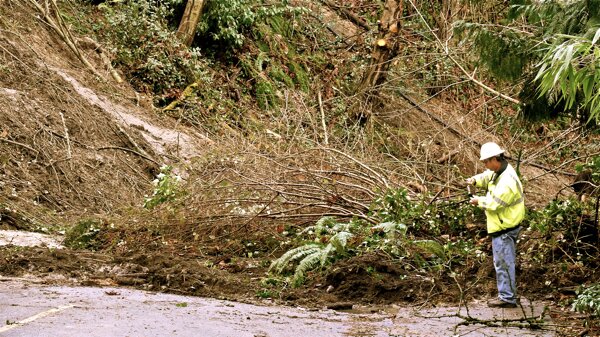 Mother Nature: collaborator in the "War on Cars"?
Mother Nature: collaborator in the "War on Cars"?
"What planet are you from?" fumed Forward Seattle’s Joe Quintana, reacting to the Cascade Bicycle Club’s David Hiller. Hiller had just suggested that living next to arterials, highways, and freeways was terrible for your health, and that our over-dependence on cars is making us obese. "I suppose diet has nothing to do with it!" Quintana said to no one in particular.
Publicola had arranged this Tuesday-night panel, moderated by Seattle Channel's C.R. Douglas, with lobbyist Quintana pitted against advocate Hiller, and Sightline's Eric de Place wonk-jousting against the Washington Policy Center's Michael Ennis. We were crowded into the back room at Liberty Bar on Capitol Hill, and Hiller seemed to know the first names of half those present.
Publicola recaps the debate nicely--and Erica fact checks the numbers thrown out here--so let me just summarize briefly before moving on to an observation of the conflict's interplanetary nature. The four did manage to agree that greater density is key to the success of transit--and also that effective transit doesn't have to mean the most expensive modes (try van pools) or even public ones (think of private bus coaches like Microsoft's Connectors, or car-sharing companies).
But while Quintana (and Ennis, to a lesser extent) did think there was a "war" on--Quintana's word choices included "jihad," "Taliban," and "Luddite," but, unaccountably, not "social engineering--Hiller and de Place refused to cop to it. They argued that cars were an important transportation solution--but an over-used one. De Place's primary message was simply that the Northwest spends $16 billion on fossil fuel every year--the money goes out of state, we get the externalized costs. ...
Story by Staff Sgt. Constance A Oberg
Sgt. Alex Diskin, a Seattle native, demonstrates some moves with fellow soldiers. (U.S. Army photo by Staff Sgt. Constance A Oberg)
CONTINGENCY OPERATING BASE SPEICHER, Iraq - Soldiers have been meeting at the Morale Welfare and Recreation building on Contingency Operating Base Speicher three nights a week to learn Tae Kwon Do, a modern martial art from Korea characterized by its fast, high spinning kicks.
Tae Kwon Do is a non-aggressive and ethical system of self defense. Training also involves a variety of techniques, to include punching, kicking, dodging, jumping, parrying and blocking.
U.S. Army 1st Lt. Robert Carlson, first platoon leader for the 220th Transportation Company, 394th Combat Sustainment Support Battalion, 3rd Sustainment Brigade, 103rd Sustainment Command (Expeditionary) and a Vernon, Conn., native, the instructor for the class, said he became interested in Tae Kwon Do after receiving a coupon for three free lessons from his father for Christmas.
Carlson has been involved in Tae Kwon Do for more than 19 years after taking the initial, free lessons. He attended private lessons at Master Hwang’s School of Tae Kwon Do. He is now sharing his passion for the sport with others.
“Billy Olundsen, my instructor for Tae Kwon Do, was very motivating and a little intimidating at first, but I received a lot of praise from him so I continued for many years,” said Carlson. “During high school, though, I was involved in a lot of sports and my academics took up a lot of my time, so I took time off for awhile from Tae Kwon Do, but went back in 2002 to get my black belt.”...
"roadside" is courtesy of our Flickr pool's rainy day photographer zenobia_joy
It's raining. It's been raining for days. Everything I own feels slightly clammy to the touch and my sweater wafts a slight reek of mildew to my nose when I move my arms. It could be my imagination, but it makes me paranoid and self-conscious.
I'm too lazy to walk the half-mile to wait for the bus out in the rain, and I'm working, again, so I go a little wild and call a taxi. The driver is from northern India, a Sikh going home tomorrow. I'm his first fare of the night--a good omen, he says, since I'm heading downtown. It's easy to pick up another quick fare downtown.
He misses the turn to Benaroya Hall, so we travel an extra block and end up stuck behind an SUV that can't decide if it wants to invest in valet parking. Robby presses me to call him after Michael Pollan's talk, when I'm ready to go home. He'll be there in five minutes, same place, for sure, so I take his number. Why not? I admire people who will ask for what they want.
I have two tickets, but it turns out I'm flying solo, so I pile my coat and baggage in the extra seat, and offer it to my neighbors for the same purpose. Everyone unloads and we all feel better. Despite the signs to check large bags and backpacks, my own backpack never elicits the slightest comment or raised eyebrow. After 20 years, it's not really a bag, it's more a leathery, brown growth that happens to contain everything I need in the event of civil disturbance or force majeur. Like a kangaroo's pouch, only with receipts and nail clippers instead of tiny infant marsupials....
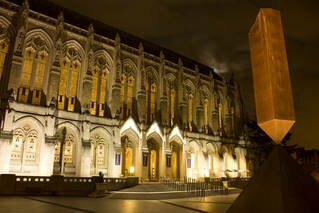 Our Flickr pool's Great Beyond gives us "Broken Obelisk at night"
Our Flickr pool's Great Beyond gives us "Broken Obelisk at night"
Ladies and gentlemen, we are taking on water, and in order to survive, some passengers need to be thrown overboard. The good news is that first class and corporate passengers are exempt. Those passengers are welcome to visit our new and improved buffet and to enjoy dancing well into the night.
This announcement also bears a striking resemblance to the weak-kneed announcement regarding the tax "deal" issued this week by the president, now living as a hostage in the White House to cynicism and greed. Just like the middle and lower classes of America.
Here at the University of Washington, this announcement was both expected and anticipated. We've been watching the water rise for a few years now. What this dispatch addresses are the various reactions across campus to the announcement.
- A dean, in an effort to sooth anxiety, sent out an email that said we should go into the holiday break in denial and just enjoy ourselves.
- The interim president, in an article in the Tacoma News Tribune this week, naively insisted that the necessity to accept "alternative funding" (read: corporatization/privatization) would never change the identity and mission of the UW.
- The faculty senate continues to meet, consternate, debate, proclaim, and declare in the cold ocean of irrelevance, since the idea of shared governance at UW is nothing more than a condescending platitude.
- Units and departments frantically rearrange deck chairs, even as the deck chairs themselves are becoming scarce.
- Students who face double digit increases in tuition, larger classes and reduced course offerings continue to Facebook and YouTube their lives away in blissful apathy, gently rocked by the waves of inevitability....
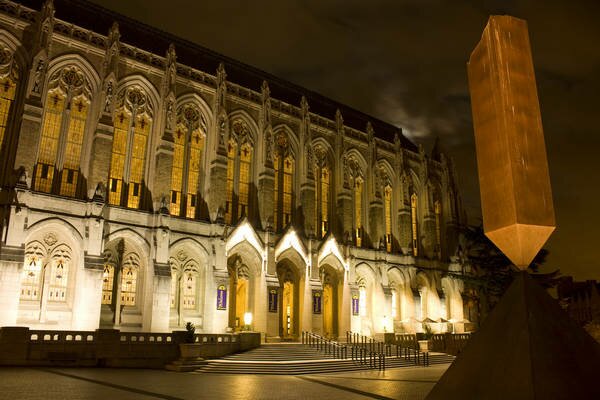 Our Flickr pool's Great Beyond gives us "Broken Obelisk at night"
Our Flickr pool's Great Beyond gives us "Broken Obelisk at night"
The cuts have already come down.
Now they come down again, but this time with more shock, more force, more impact. Straight from Olympia. Tens of millions will be lost in this saga. But the tens of millions tally up to something more profound than cash: the loss of minds. Young minds who want to learn. Wise minds who want to teach.
Our minds, if we let this happen as a region.
The University of Washington, like every kindergarten, elementary, junior and high school and higher learning institution in our country is facing a war of historical dimensions.
What is this war about?
It is about whether we should measure the worth of knowledge and thinking with a calculator. It is about whether a free, thriving and independent learning academy has a place in our society. It is about whether our state and our citizens envision a future where knowledge for the sake of future knowledge is a value....
If you felt an outpouring of lovingkindness while walking past the Convention Center yesterday, it was likely because over 1,000 people were gathered inside to celebrate National Philanthropy Day, hosted by AFP Washington. I was glad to attend, because on a day when unemployment cut-offs and ballooning deficits were in the news, it was particularly good to hear about Seattle's pathbreaking philanthropic engagement.
The lunch was emceed by KCTS's Enrique Cerna, and former Mayor Norm Rice spoke as well, but both men knew that the stars of the afternoon were the honorees, and said as much. In fact, the theme of the day was the "faces of philanthropy"--Seattle's populist spirit emerging even when it comes to what you'd imagine would be a wealthy-elbow-rubbing affair.
In a town where you can run into a sweater-and-khaki-wearing Bill Gates catching a matinée at the Harvard Exit, it makes sense that Matt Griffin (a commercial real estate developer) and Evelyne Rozner (founder of her business consultancy, The Rozner Co.) were low-key about their Outstanding Philanthropists award, given because they "have not only contributed substantially to local and national nonprofits, they have also led efforts that raised more than $250 million for causes they support."
Rozner won applause for warning that an obsession with efficiency and short-term fiscal prudence (as measured by cents per dollar that go to administration "versus" operations) is harmful to non-profits, who need to be allowed to experiment and test out new practices.
The Whatcom Community Foundation was honored for Outstanding Philanthropy Organization (President Mauri Ingram's wry sense of humor won her a "She'll be here all week, folks" from Cerna), and the Moles family was recognized in the Outstanding Philanthropic Family category. For your family's reference, here's the contribution benchmark you should aim for: ...
Every so often, people who like to think of their reality as fact-based (most everyone, then) throw up their hands and ask what is to be done about people who "don't get it," as if there's some formula. This isn't a partisan viewpoint; it reflects biases we all have, which tend to show up in how we intuitively imagine consequences of action. But sometimes how we imagine builds those biases.
If you force "four busy lanes of traffic into two," after all, anyone can see that a congested crawl will be the result. In a feeble economy, it doesn't take a rocket scientist to know you need to make substantial cuts to keep the state's deficit down. If you want to save on electricity, even a child could tell you that the best thing is to turn the heat down.
Except none of that may be true.
It's based on what is easy to visualize, rather than what isn't. In the case of a road diet, the third, bi-directional turn lane gets overlooked, but left-turning cars block traffic in a four-lane model--and it gets worse the busier the street gets. So far as deficits go, consider a liquidity trap--again, harder to visualize than simply cutting to make fit. And that electric bill? "Making retrofits, for example, saves far more energy than turning down the heat a few degrees."...
Special to The SunBreak by Heidi Boren
Things have come full circle for me and for Seattle since 1994. That was the year I danced at The Lusty Lady. It was also the April that Kurt Cobain ended his life. Now, The Lusty Lady is shutting its doors this June 27, while the Kurt exhibit draws visitors just across the street at the Seattle Art Museum.
SAM, the reborn Seattle Art Museum on First Avenue, was just a baby back then. Hammering Man had been recently, uh, erected, and The Lusty Lady had the cheek to comment on him from its pink-framed marquee with "Hammer Away, Big Guy." But as pithy as the marquee had always been, the Lusty was still just another sex arcade down at the end of "Flesh" Avenue. A girl who worked at one of these places was probably also a hooker, and most certainly suffered from low self-esteem.
A stripper named Jane, who I met in New Mexico, had challenged those notions for me. When I asked her why she, someone who had a high school diploma, no addictions, and could have worked anywhere else in town, worked as a dancer at a strip club, she told me she didn't want to end up "one of those people from suburbia who thinks Cat Stevens is a real person."
As my musical tastes ran directly to Cat Stevens and Suzanne Vega, I didn't really grasp what she meant. When she died in a motorcycle accident a few months later, however, I decided I wanted to find out.
Having written a single, five-page play that had been well received by my professor in college, I considered myself the premier dramatic voice of my generation. My plan was to get myself back to Seattle where I had a sister who was a soft touch with money. There, I would live out Jane's quest and write an award-winning play about it....
 This segment is on East John St., just before Broadway.
This segment is on East John St., just before Broadway.
Last week, the Mayor and Council member Tom Rasmussen added another chapter to the endless sparring over tunnel cost overruns, and the Council's Tim Burgess announced that it was time to consider an all-out ban on plastic grocery bags. Earlier, in mid-May, the Council committed Seattle to an Arizona boycott. You wouldn't think, with all the cost overruns debate and the getting tough on panhandlers and plastic bags and Arizona, that there was anything more pressing to be done. So I have collected five photographs I'd like them to take a look at.
I have a short bicycle ride, five to ten minutes, across Capitol Hill to my office. This morning I stopped to take photos of the larger potholes on my route. (Parts of 14th Ave. E. are all potholes, but they're smaller in size.) My point is, these are photos of convenience; I didn't stop if traffic was coming, or if the pothole was on the far side of the road. Any of these, if I hit them right, might send me over the handlebars into traffic.
I don't believe the Seattle Department of Transportation is studiously ignoring Capitol Hill--everywhere I go around Seattle I see similar signs of disrepair. There is an SDOT pothole report hotline (206-684-7623, also online), but it's like playing whack-a-mole. The repairs rarely last for long. Even repaved streets don't seem to last for long, especially where there's heavy bus traffic. (I'm not blaming buses--this would suggest to me that the streets aren't being built to withstand heavy bus traffic in the first place.)
In 2006, Seattle voters passed the Bridging the Gap levy, a nine-year, $365-million transportation maintenance and improvements project specifically to catch up on deferred road maintenance. That is in addition to what is already budgeted, of course. Here is photographic evidence of just how well that's working. ...
Posted on behalf of Mike Gillis, Board member of Seattle Atheists. "Everybody Draw Mohammed Day" was an idea conceived by Seattle cartoonist Molly Norris who jokingly floated the idea in reaction to South Park's debacle with portraying Mohammed in an episode of the animated series.
I support "Everybody Draw Mohammed Day." Why? Because I support free speech. Even speech I don't like. Especially speech I don't like.
Just the same way I'd support "Everybody Eat a Hamburger Day," if it were Hindus using threats of violence against people who ate beef.
In a free society, free speech means having the right to say exactly what someone doesn't want to hear. If you don't like what someone has to say, you need to answer with your own free speech. Violence and the threat of it is not free speech. It is the admission that you have a losing argument in favor of your position. Nothing justifies violence to chill free speech, not one having their religious sensibilities offended. Nothing.
If some religious person drew an offensive cartoon or wrote an offensive op-ed about atheists, it would be insane and morally reprehensible for me to kill the person who wrote or drew it. It would be wrong for me to cut off their head, shoot them eight times and stab them through the heart. It would be wrong for me to set embassies on fire and beat people up.
It would be wrong for me to chant for their deaths and call upon other atheists to kill them for being offensive. It would be wrong for me to imply a death threat to the writer or cartoonist and then post pictures of the above beheaded murder victim on my website. It would be wrong for me to break into the writer or cartoonist's house with an axe and try to kill them in front of their grandchild. Ever. No matter how much I was offended. No matter how bad the cartoons or op-ed was....
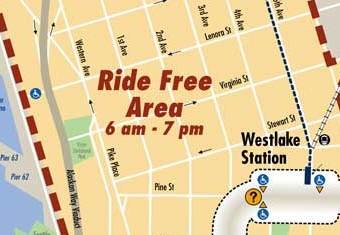 Rush hour on a Downtown-bound Metro bus. Traffic heavy, weather bad, everyone a little grumpy.
Rush hour on a Downtown-bound Metro bus. Traffic heavy, weather bad, everyone a little grumpy.
A bulky middle-aged woman in a white t-shirt gets on and drops into the open seat nearest the bus driver. She addresses the back of his head in a loud, quavering voice.
"Is it true they're thinking about getting rid of the ride free zone?"
"There's been talk about it," the driver replies listlessly.
"That's horrible."
A long pause commences while the bus driver considers. "Might keep out some of the riffraff," he offers.
"Well some of us are homeless, and don't have any way to get around except in the ride free zone!"
Now a pause that's far longer and very uncomfortable. The driver breaks the silence.
"Trust me, there's a lo-o-o-ot of riffraff."
The woman harumphs.
"I'm the one who has to deal with them," says the driver.
"Well, you've never been homeless."
"Oh, yes, I have, ma'am," the driver says, his voice suddenly loud and indignant. "Don't tell me what I've been."
"Then you should know what it's like," says the woman, collecting her stuff and moving toward the exit.
"I got myself out of it," says the driver. The woman begins to walk down the stairs.
"Well, good for you," she says, sarcastically, as she climbs off.
It must have looked good on paper. Marquette University wanted to hire Seattle University's sociology professor Jodi O'Brien, chair of the sociology department, to be dean of arts and sciences. They extended her a job offer, O'Brien accepted. The signed contract was in the mail, the Seattle University Spectator says, when she got the take-backsies phone call.
AP reports that: "The archdiocese acknowledges [Milwaukee] Archbishop Jerome Listecki called Marquette President Father Robert Wild about the university's offer to Seattle University professor Jodi O'Brien," though the university stoutly insists its unprofessional behavior is its own doing. Citing worries that the openly gay O'Brien's hiring would "create dichotomies and cause tensions," Marquette's administration managed to vault itself--dichotomous, tension-filled--into the national spotlight.
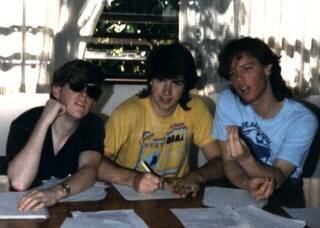 Wayback Machine: That's MvB on the left and John Drabinski on the right. Center guy is from Portland, which you can totally tell.
Wayback Machine: That's MvB on the left and John Drabinski on the right. Center guy is from Portland, which you can totally tell.
First, is this an embarrassing kerfluffle or a major issue? Good for Seattle U, bad for Marquette?
Well, Catholic schools are at a crossroads, I think: Either you continue along with mainstream higher-education, which really does value diverse forms of critical inquiry, or you throw your lot in with the fundamentalists and the religious right.
For Seattle U, I think this is good. And Seattle U is also good for Catholic universities generally, because this goes against the growing narrative about Catholics and Catholic schools as indifferent to child abuse, backwards, out of touch, equivalent to the religious right. Bad for Marquette because now, no matter what the school does, it is branded a right-wing outpost. Sadly, because Marquette is a perfectly fine school with solid academic standards.
I feel terrible for the MU students. Seriously. They must be incredibly embarrassed. For quite awhile, they'll have to explain how they are not like Marquette, even though they went to Marquette....
Our stranded-in-Berlin correspondent, Charles Redell (who writes on sustainability and hangs out at Office Nomads) was supposed to fly home to Seattle on Saturday, but an unpronounceable Icelandic volcano put an end to that. Here is his first, second, and third reports on dealing with his unexpected stayover.
My time here in Germany is starting to turn into some semblance of a normal life, if you can believe it.
What does normal mean in completely abnormal circumstances?
It means spending the morning working in the hotel lobby surrounded by ten or so newly-expat compatriots while the U.S. sleeps. Talk about a great way to get through backlogged emails.
It means taking a break around noon and biking to a new neighborhood that may promise new adventures, new food, or at least new scenery. This in turn means finding a small cafe in an up-and-coming part of town and parking oneself on the balcony above the fray watching and analyzing the comings and goings of young, hip, beautiful Berlin.
"There's one that's in love with the barista."
"Look, Americans."
And also finding ways to tune out the constant drone of German techno....
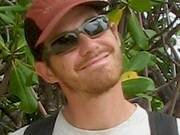 To re-cap: A group of twenty journalists traveled to Germany for a week to explore green building in Germany thanks to the German Foreign Ministry and The Eco-Logic Institute. Near the end of the trip, a volcano in Iceland erupted and European airspace was shut down.
To re-cap: A group of twenty journalists traveled to Germany for a week to explore green building in Germany thanks to the German Foreign Ministry and The Eco-Logic Institute. Near the end of the trip, a volcano in Iceland erupted and European airspace was shut down.
Our stranded-in-Berlin correspondent, Charles Redell (who writes on sustainability and hangs out at Office Nomads) was supposed to fly out on Saturday, but instead he spent it traveling to the airport to rebook tickets, then being a tourist for a few hours. By the end of the day, Charles' re-booked flight on Sunday was canceled and he was told that next Sunday was the soonest he could get on a flight. Here is his first dispatch and his second dispatch.
Things in Berlin are looking up, for our group anyway.
Today dawned sunny and warm, prompting a few of us to explore the possibility of renting bikes for our stay here. We found an awesome program, run by the German rail system. Simply put, you register with Call A Bike and then pick up a bike at the train station. A computer lock tracks your time with it and you're charged .08Eur per minute (9Eur for a day and 36Eur for a week). When you're done, lock the bike, call the system and number and tell them where in the downtown core it is, and they pick it up. Could not be more simple.
We took a nice slow ride out to the airport, six kilometers away. The entire trip was on dedicated bike infrastructure, much of it grade separated and with bike signal lights. There were no lines at the airport and I got a ticket booked for Thursday, which is currently everyone's best guess for the second day travel will be allowed.
On our ride, we found a trail along the river that ended up winding through a collection of small cottages that seem to be weekend homes for Berliners, within an easy bike ride of the city. In the summer, when the city is stultifying, they seemed to the perfect solution for a population addicted to true sustainable urban living.
Now, we sit, satisfied with our day, in love with our adopted city, and relatively content with the idea of spending more time living and working here, even if when it may end is unclear. [Photos after the jump.]...
 Our stranded-in-Berlin correspondent is Charles Redell, who writes on sustainability, hangs out at Office Nomads (oh, the irony!), and was in Berlin for a international green conference. He's still very much there, thanks to Iceland's ash-spewing Eyjafjallajokull volcano, which has disrupted flights worldwide. Here is his first dispatch. This one includes a photo gallery after the letter portion:
Our stranded-in-Berlin correspondent is Charles Redell, who writes on sustainability, hangs out at Office Nomads (oh, the irony!), and was in Berlin for a international green conference. He's still very much there, thanks to Iceland's ash-spewing Eyjafjallajokull volcano, which has disrupted flights worldwide. Here is his first dispatch. This one includes a photo gallery after the letter portion:
I've been trying to sort out how to explain what's been happening while stuck here in Germany for an indeterminate amount of time because of a volcano (a volcano!) and finding it terribly difficult. One thing about this experience is that things have been happening very fast, and very slowly at the same time.
Last night as I sat down to write about my day of bureaucracy, I realized that events I thought took place Friday actually happened earlier that same morning. But by the time I was writing, I'd been through two re-bookings, bought and returned a train ticket to Frankfurt, and done some touristy stuff.
Keeping up with things in anything like real time is impractical, if not impossible, since my smart phone is not compatible with European cell networks (I am forced to find a hotspot to use it or my laptop), and compiling all my thoughts at the end of the day just turns into a long ramble of events, experiences and thoughts, none of which can be sorted until this is all over.
So in the place of dispatches from an isolated Europe, I offer you images of the effects as I see them. In only some will the direct relationship to this unprecedented event be obvious, but over the coming days, the shots I send back will be things I've experienced only because of the Icelandic volcanic eruption and images of Berlin and Europeans dealing with it.
In the meantime, wish me luck as I look to rent a bike and ride it first to the airport, and then wherever the wonderful bike infrastructure takes me. Oh, and if you can work on helping me manifest clear skies and a seat on an airplane before next Sunday, that'd be great too. [Photos after the jump.]...
 The Toronto Star is doing it, so we will too. Our stranded-in-Berlin correspondent is Charles Redell, who writes on sustainability, hangs out at Office Nomads (oh, the irony!), and was in Berlin for a international green conference. He's still very much there, thanks to Iceland's ash-spewing Eyjafjallajokull volcano, which has disrupted flights worldwide. Here is his "letter home" about how he learned of his extended stay, and spent his Saturday.
The Toronto Star is doing it, so we will too. Our stranded-in-Berlin correspondent is Charles Redell, who writes on sustainability, hangs out at Office Nomads (oh, the irony!), and was in Berlin for a international green conference. He's still very much there, thanks to Iceland's ash-spewing Eyjafjallajokull volcano, which has disrupted flights worldwide. Here is his "letter home" about how he learned of his extended stay, and spent his Saturday.
Word of the Icelandic volcano eruption first came as some kind of odd rumor. It was one of those stories that just don't make any sense on a morning when your brain is foggy from four days of travel, non-stop events, and Berlin beer halls.
As the day progressed though, the details became clear and all of us started realizing that with the press tour ending last Friday and flights home starting on Saturday, things were about to get interesting.
By Friday night's closing dinner, we all knew that this was not, actually, a closing dinner. All of our flights were canceled by then. A group gathered in my very small hotel room with our laptops and began Skyping all our airlines.
By 3 a.m. some ridiculous trips had been planned (a 5:30 a.m. train on Sunday from Berlin to Frankfurt to catch a 2 p.m. flight to Houston, with a connection to Seattle, for example), and we stumbled to bed.
When we woke up on Saturday though, things looked sour--and the hotel was telling us all that we couldn't stay. One of the airlines had booked all the rooms. We panicked. After a quick cup or seven of coffee, my brain slipped into planning mode.
We decided all to go to the travel agent who booked us to try and get alternatives, since the airports were now looking as if they were going to open by Sunday. Before we started off, we heard from the organizer of our trip, calling to tell us he had found the entire group rooms at a new hotel.
When he heard our plan to attack the travel agent, he told us not to bother: the office "is not what you think it is." With no cell phones with international plans, we couldn't call anyone, so we struck out for the downtown Berlin Lufthansa office. Which is closed on weekends (really).
We dug up a travel agent who said all we could do was call the airline or go to the airport. The news kept saying not to go to the airport, but calling meant being on hold for hours and they generally won't do anything when you do get through. We decided to go out there as it is just a 30-minute U-bahn (subway) ride....
 The Kingdome looms over the guided missile cruiser USS LEAHY (CG-16), arriving in port during the Seattle Sea Fair 1982. (Photo by PH1 HAROLD J. GERWIEN)
The Kingdome looms over the guided missile cruiser USS LEAHY (CG-16), arriving in port during the Seattle Sea Fair 1982. (Photo by PH1 HAROLD J. GERWIEN)
I wrote the following article on the Kingdome's death just under 10 years ago. Since this is the anniversary of the building's implosion, I thought this was a good time to re-present it and remember the Dome in the days after its extinction but before it became a very dim memory:
I didn’t see the Kingdome’s end. I didn’t see the Kingdome’s beginning. I did, though, grow more and more familiar with it throughout the '90s, first as an occasional visitor, then as a Seattle resident.
It always seemed out of place in Seattle’s skyline: the lean skyscrapers glistening off the water and dockside piers and shipping facilities giving way to a plump, squat mushroom bulging above rows of SoDo warehouses. What was that concrete behemoth doing adjacent to the brick and stone of Pioneer Square?
But watching Mariner games (I never saw anything else in the Dome, save one high school basketball title game) was pretty enjoyable. The controlled climate assured you that the weather wouldn’t intrude on the game, while the dome and carpeted field gave the event a sort of domestic, suburban feeling—like nothing too dramatic or traumatizing would happen.
Usually that was the case: There’s only one game I remember at all vividly. (I missed the big comeback run in 1995, only to later start up a website chronicling those games.) The last time I was in the Kingdome, in the summer of 1998, the Mariners played a 15 or 16-inning game, filled with extra-inning near-defeats for both sides, until the Mariners lost it....
When you step onto a Metro bus operated by Nathan Vass, I guarantee you will step off smiling.
For Vass, a smile is all he asks. Vass is a 23-year-old Metro operator, one of the youngest to win the Operator of the Month award in both age and seniority. He's also probably the most interesting young bus driver you will ever meet.
Not a lot of 21st birthday dreams consist of a Metro application, it's safe to say. But Vass had buses on his mind. (Twenty-one is the youngest a Metro operator can be, and his age was the last thing stopping him from fulfilling his dream.) "As a kid, the bus was a symbol of going wherever the hell you wanted to go," he explained.
Vass had a vast knowledge of bus history and information well before he became an operator, and knew Seattle was where he wanted to put that knowledge to use. As the birthplace of on-bus bike racks and wheelchair lifts, Vass said, Seattle is "an amazing system." Compared to what he described as the "grid-like routes of L.A.," Seattle's routes, he said, actually line up with people's travel patterns....
Wallyhood's Jordan Schwartz has a King Day post up that is worth your time.
My full, legal name is Jordan Luther King Schwartz. Kind of an unusual name for a white guy (and a Jew, no less).
How did I end up with a name usually reserved for civil rights memorials and streets running through the hood?
Back in early 1960’s, Jim Crow laws, mandating separate facilities for blacks and whites throughout the South, were still very much on the books and enforced. When Dallas County, Alabama blacks showed up on one of the two days per month they were allowed to apply to vote, for example, they were arrested and beaten. Of those few that managed to fill out an application, most were denied. Of 57,000 black citizens, only 130 were allowed to vote. [read the rest at Wallyhood]
 Moments later, Santa was pulled into the cage and nearly killed.
Moments later, Santa was pulled into the cage and nearly killed.
Ed. note: This story was originally posted last year on Seattlest and I'm bringing it back this year in the hopes it will become a treasured holiday tradition. Rest in peace, smelly cat.
When I looked down and saw the small pool of copper brown gel on the soft white cuff of my Santa uniform, the scent that had been offending me for nearly half an hour was suddenly made very clear. Just to be sure, I brought the sleeve to within an inch of my nose for a little sniff. Yes, there it was--a decidedly potent Preparation H-like substance that must have come from the small, terrified dog I'd met earlier who would have nothing to do with me. As the dog had struggled and pushed away, kicking violently at my ribs with its pointed little feet, it had slimed Santa with its anal gel.
After washing the cuff with soap and warm water, I could still smell the offensive odor. A further examination presented yet another smear of the brown slick mingling among the coarse white hairs of my beard, mere inches from my mouth. Luckily for me, a back-up beard waited in the employee lounge. Does this happen often? I wondered. Clean and newly bearded, I walked back to my post at the front of the store, thinking to myself that however sorry I felt for the little dog and its apparent discomfort, I thoroughly hated the human who'd set its exposed, hemorrhoid gel-covered anus in my arms.
During lulls in the photo-taking, I would occasionally walk outside for fresh air and wave at people at random. I would also wander the aisles of the store, often catching people off guard. I found it amusing to imagine someone suddenly seeing Santa in the corner of their eye, flipping through a book regarding the proper care of ferrets. It was during these expeditions that I made an interesting observation. Often, adult men would give me an accusing look as if to say, "Just who the hell do you think you are?" Women, however, would almost always smile and say, "Hi Santa," thereby proving my theory that all women want to sleep with Santa, which, comforted by this knowledge, is how I made it through two long days dressed as him....
Special to The SunBreak by Matt Mason.
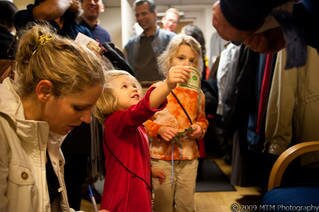 MTM Photography: Jensen, 2, does her part at the Wallingford Senior Center Fundraiser on November 19.
MTM Photography: Jensen, 2, does her part at the Wallingford Senior Center Fundraiser on November 19.
Thursday night at the Wallingford Senior Center was of special importance to the community life of the Wallingford neighborhood. The "Brother Can you Spare a Dime" a soup line fundraiser for the Wallingford Senior Center was a great success. But it was only the beginning.
The Senior Center has already cut back to one daily staff member, who happens to also be the executive director of the Center, Kathleen Cromp. Faced with the big picture and the daily details she describes the last few months as a roller-coaster. This event is a hopeful step in developing the grass roots support that the center needs to recover from this closure and restart full programming in the new year. Faced with old debts and a lack of operating funds the Center's Board of Directors is developing a sustainable model it hopes to implement if the community and financial support can be secured.
The fundraiser was sponsored by the Wallingford Community Council and the Chamber of Commerce, along with over a dozen local businesses. Selena's Guadalajara donated tortilla soup, Chutney's Bistro provided the mango lassi, and Trophy Cupcakes satisfied the sweet tooth with a tower of mini-cupcakes. Local bluegrass band Lost in the Fog also donated their time to perform.
All of the businesses involved and the dozens of volunteers at the event believe in this cause and based on the turnout, the people of the community are beginning to see the value as well. Part of the evenings program allowed a few minutes for people to share with the gathered audience.
Wallingford resident and ex-mayoral candidate Joe Mallahan came out in support along with City Council Member Tom Rasmussen.
Rasmussen spoke for a few minutes to the packed hall calling this a "wake-up call to our community" he noted that what makes the difference in the success or failure of a center is the community spirit behind it. He emphasized the need for the Senior Center as a way to "help older people stay independent and in their homes," saying it provides a framework of support and a second family to help fulfill the needs of community members. Rasmussen concluded by adding this is "insurance for our future."
Ralph Moser stood and shared his experiences at the Center. He and his wife, Nancy, felt instantly at home four years ago when they received their personal tour of the facility. This introductory tour is something provided for all new members. He and his wife have a short five-minute drive to the Center, which has lots of easy parking. They take part in yoga, general exercise, and current events. They also are sure to attend the lunches, spaghetti dinners and monthly Sunday pancake breakfast. He commented on the programs saying, "It's no big deal but it means a lot [to us]." He has developed many very dear friends and feels a stronger tie to the community through the Center....
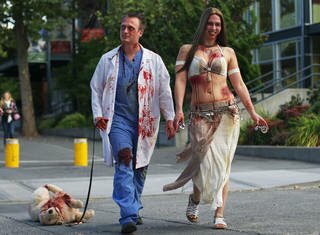 Our SunBreak Flickr Pool delivers perfectly, thanks to mangpages.
Our SunBreak Flickr Pool delivers perfectly, thanks to mangpages.
Mainstream news is having a hard time reporting on Robert and Brenda Vale's study (actually a book) called Time to Eat the Dog? The Real Guide to Sustainable Living. CBS News begins its story like this: "So apparently Rover whizzing on the carpet isn't the worst thing he does. Not by a long shot. He's also killing the planet." Locally, the Seattle Times is more laconic: "Thanks for killing the planet, dog owners."
The upshot of the Vales' figurings is that the ecological footprint of a medium-sized or large dog, based on its food intake, is greater than that of an SUV (a 4.6-litre Toyota Land Cruiser) driven 10,000 km per year. (That's including both the SUV's fuel and the energy used to build it.)
While the book's title is clearly a provocation, the message gets lost in the weeds. In both stories, there's a lot of scoffing from the outset, even though the study's limited parameters have been backed up by New Scientist, in their article, "How green is your pet?"
The Times pitted our local eco-wonk, Sightline's Clark Williams-Derry, against New Scientist.
"When I saw the study I ran some quick numbers," Williams-Derry said. "The average dog has to eat at least twice as much as the average person for this to be right. People are just heavier than dogs so, I just had to scratch my head at that."
[UPDATE: I should have checked Sightline's blog before I wrote this: Clark picks the study apart on a number of its assumptions--not least of which is what we're actually feeding our dogs.]
One: Regardless of what the authors intended, the conclusion that should be drawn from the study is that eating meat, in general, is energy intensive. It doesn't matter who is eating the meat, you or your dog; it's costing an arm and a leg ecologically. That is not always the case, depending on who is raising the meat, but it's fair to say that our industrial meat producers don't tend to have sustainability top of mind.
That is why someone like Michael Pollan might suggest that "A vegan in a Hummer has a lighter carbon footprint than a beef eater in a Prius." He's had to retract that statement because of the "carbon" qualifier, which leads to a fairly strong criticism of the Vale's study. Inputs are not the whole picture--there are also outputs....
Hello!
Twitter: @thesunbreak | Facebook
iPhone app download (Free!)
Subscribe to The SunBreak
Delivery Options
![]() Subscribe to all SunBreak Stories
Subscribe to all SunBreak Stories
Daily Email Digest of The SunBreak
Most Viewed Stories
Latest Headlines
- Taproot Theatre's "The Oddyssey" Is a Thoughtful (and Traditional) Treatment of a Classic
- BREAKING: Intiman Theater Needs $500K By End of March to Keep Doors Open
- Zoo Gets in the Valentine's Day Spirit
- Choreographer Amy O'Neal Gives Us the Lowdown on "The Lowdown," Tonight at the Moore
- Town Hall Community Fund Wants to Subsidize Your Project
Recently in Our Flickr Photo Pool
www.flickr.com
|
Our Facebook Fan Page
Neighborhood Blog News
Niche Blog News
Seattle Weather
Get the SunBreak iPhone App

Download the SunBreak iPhone app for free.
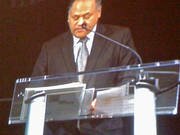
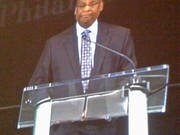
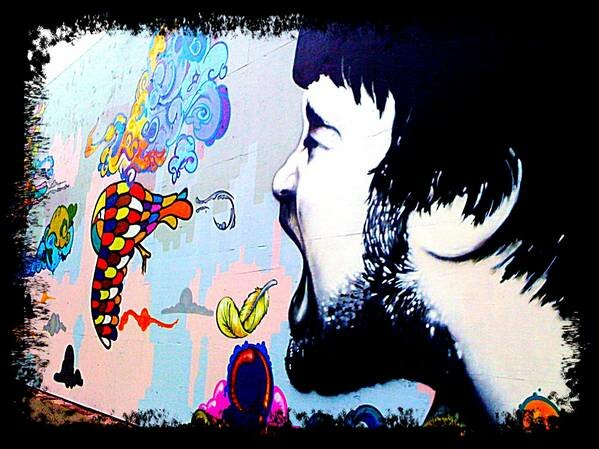


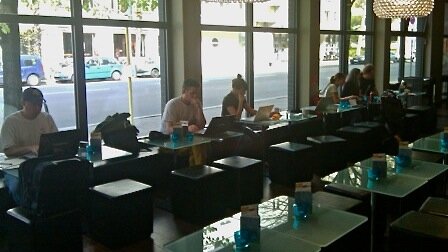
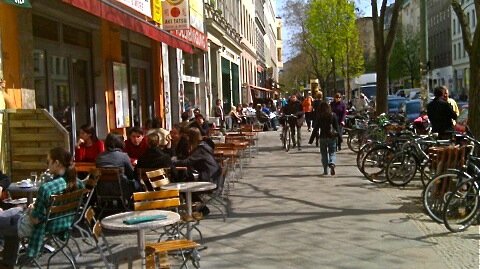
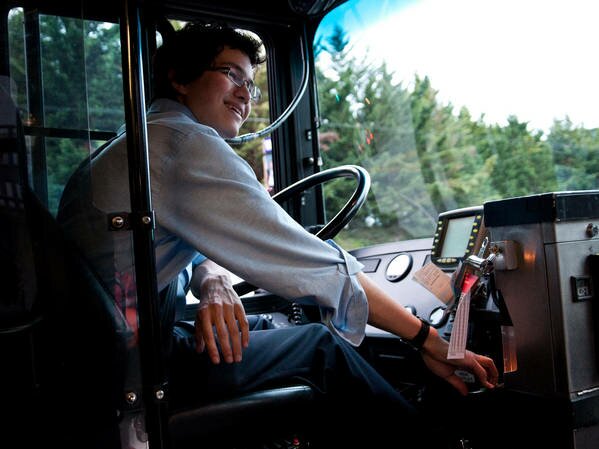
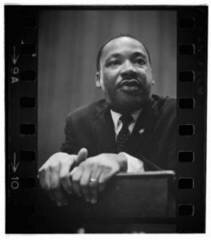

Most Recent Comments